Unit 12 What did you do last weekend? Section B (2a-2c)课件(共35张PPT)
文档属性
| 名称 | Unit 12 What did you do last weekend? Section B (2a-2c)课件(共35张PPT) | 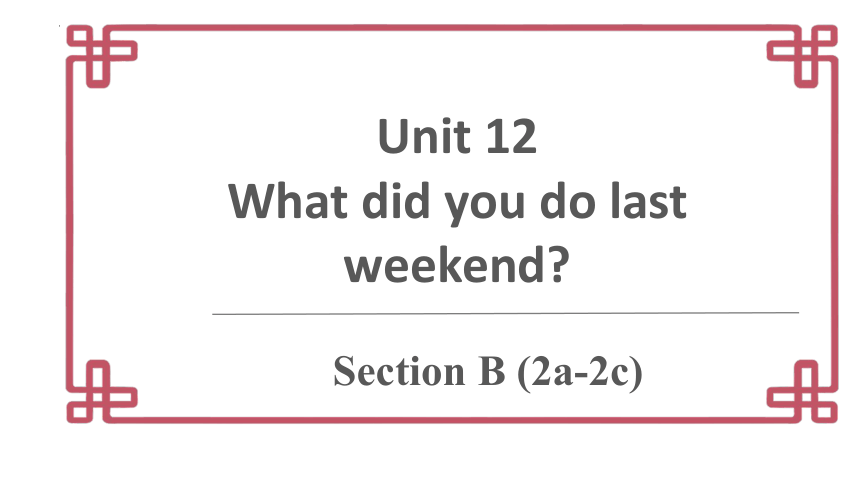 | |
| 格式 | pptx | ||
| 文件大小 | 3.7MB | ||
| 资源类型 | 教案 | ||
| 版本资源 | 人教新目标(Go for it)版 | ||
| 科目 | 英语 | ||
| 更新时间 | 2024-04-17 17:50:30 | ||
图片预览


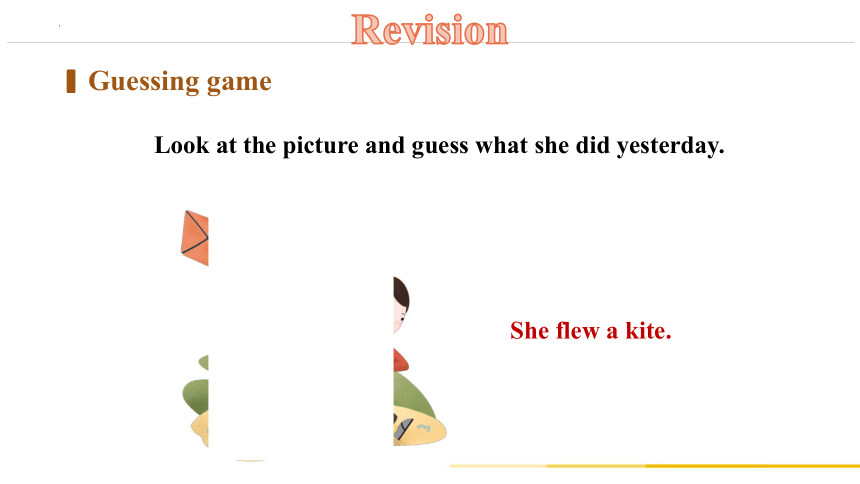
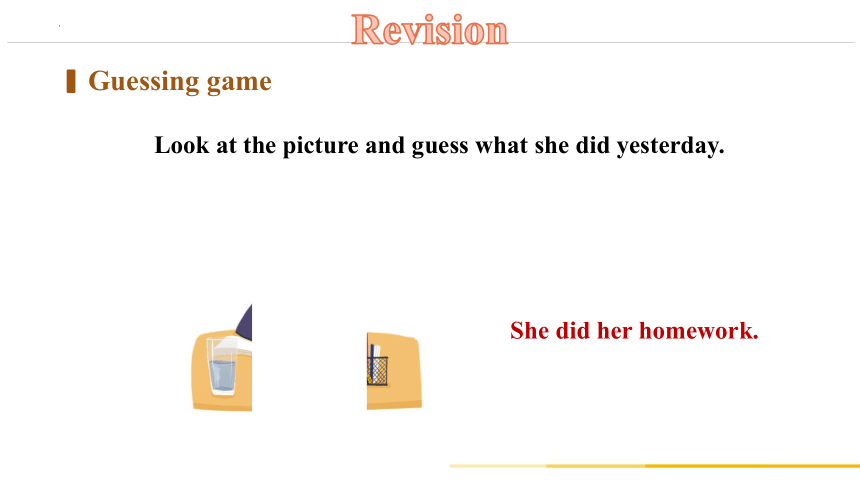
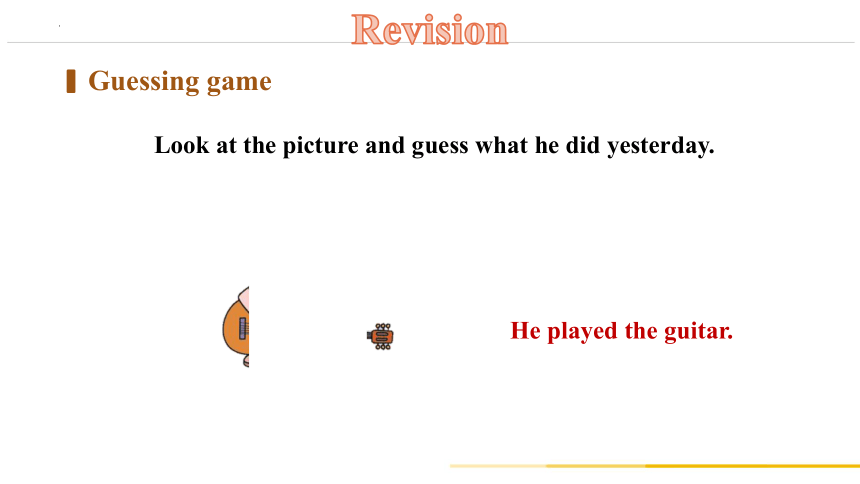
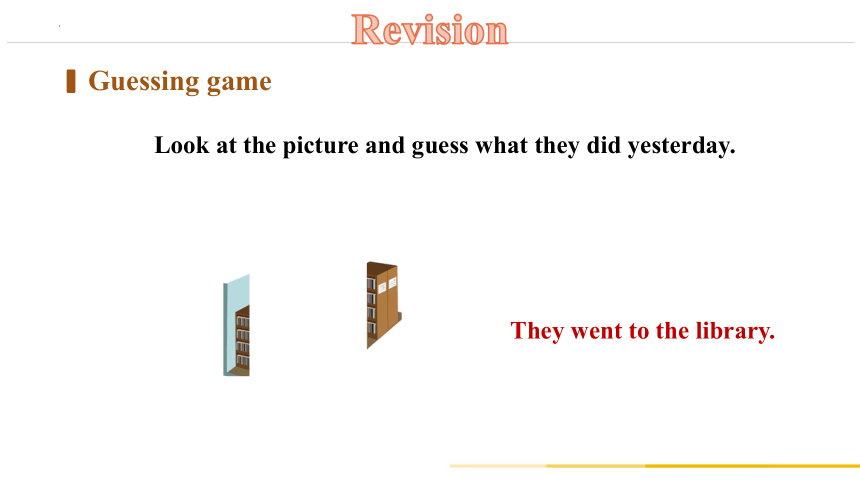
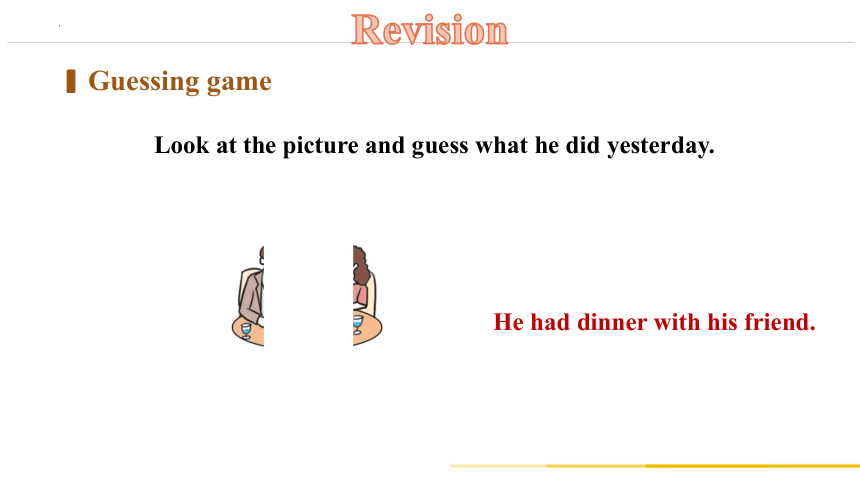
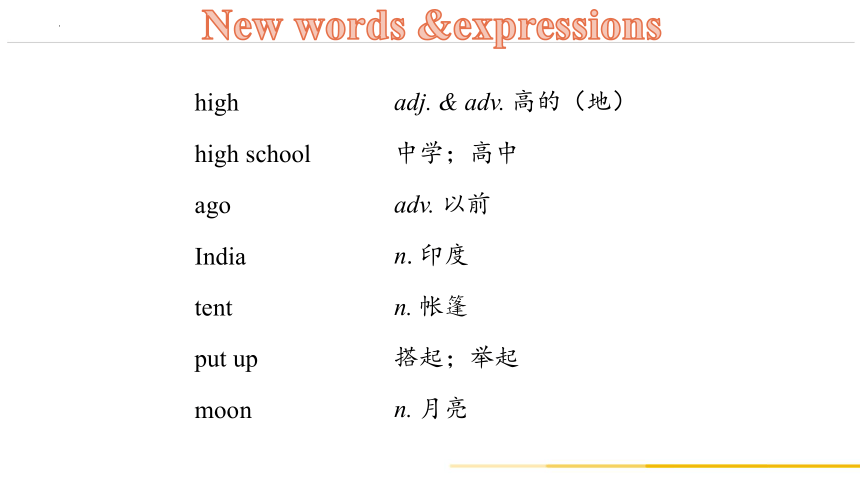
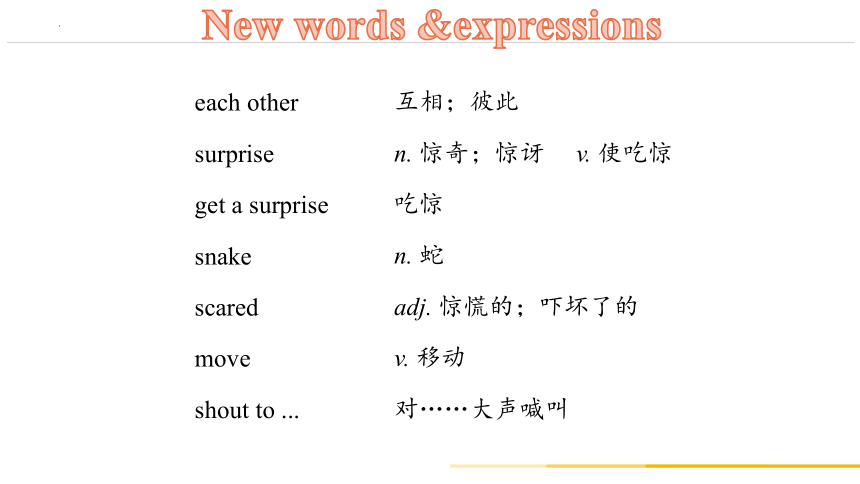

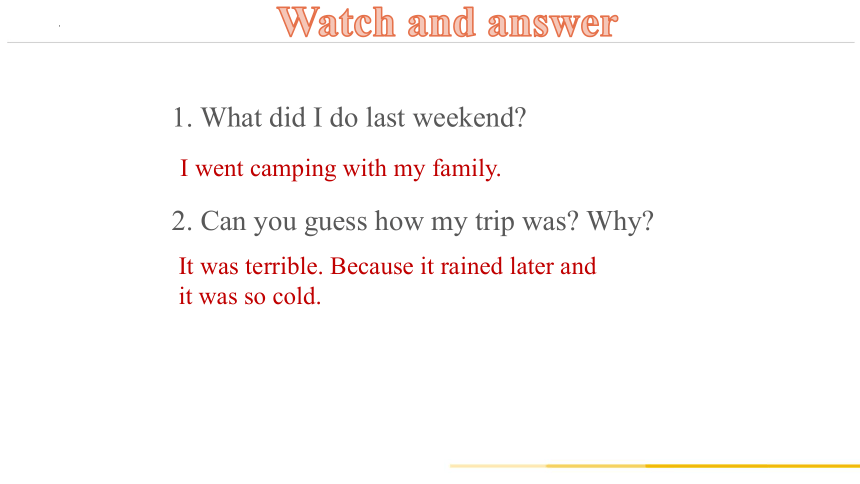
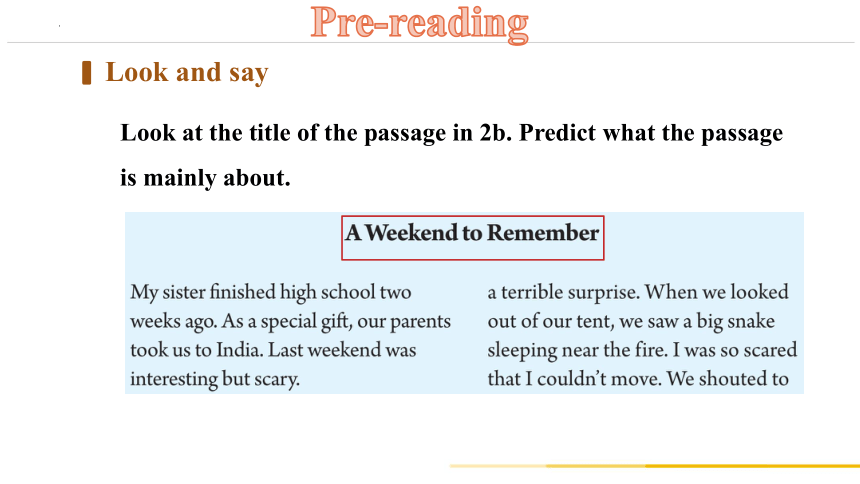
文档简介
(共35张PPT)
Unit 12
What did you do last weekend
Section B (2a-2c)
1. 能够读懂关于描述上周末旅行的语篇内容。
2. 能够在阅读任务中提取关键信息、构建语篇框架,同时能够按照 时间顺序向他人讲述故事发生的始末。
3. 通过学习在野外遇到危险的故事,培养学生遇到危险时保持冷静、及时寻求他人帮助的意识。
Teaching aims
Guessing game
Look at the picture and guess what she did yesterday.
She flew a kite.
Revision
Guessing game
Look at the picture and guess what she did yesterday.
She did her homework.
Revision
Guessing game
Look at the picture and guess what he did yesterday.
He played the guitar.
Revision
Guessing game
Look at the picture and guess what they did yesterday.
They went to the library.
Revision
Guessing game
Look at the picture and guess what he did yesterday.
He had dinner with his friend.
Revision
high
high school
ago
India
tent
put up
moon
adj. & adv. 高的(地)
中学;高中
adv. 以前
n. 印度
n. 帐篷
搭起;举起
n. 月亮
New words &expressions
each other
surprise
get a surprise
snake
scared
move
shout to ...
互相;彼此
n. 惊奇;惊讶 v. 使吃惊
吃惊
n. 蛇
adj. 惊慌的;吓坏了的
v. 移动
对……大声喊叫
New words &expressions
start
jump
up and down
wake
wake ... up
into
forest
ear
v. 开始;着手
v. 跳;跃
上上下下;起伏
v. 弄醒;醒
把……弄醒
prep. 到……里面;进入
n. 森林
n. 耳朵
New words &expressions
1. What did I do last weekend
2. Can you guess how my trip was Why
I went camping with my family.
It was terrible. Because it rained later and it was so cold.
Watch and answer
Look and say
Look at the title of the passage in 2b. Predict what the passage is mainly about.
Pre-reading
Read the passage in 2b quickly and choose the main idea for each paragraph.
A.A scary surprise
B.The background of the story
C.What interesting things we did
Para. 1 ______ Para. 2 ______ Para. 3 ______
B
C
A
While-reading
1.How was Lisa’s weekend
2.When did Lisa’s sister finish high school
3.What was the special gift
Read the first paragraph and answer the questions.
It was interesting but scary.
Two weeks ago.
Lisa’s parents took Lisa and her sister to India.
While-reading
1.Where did Lisa and her family go last weekend
2.How did they go there
3.Why did Lisa go to sleep early
Read the second paragraph and answer the questions.
They went to a small village in India.
They took a bus there.
Because she was too tired.
While-reading
Say what they did during the camping trip according to the pictures.
took a long bus ride
put up tents
made a fire
cooked food
went to sleep
sat under the moon
and told stories
While-reading
1.How did Lisa feel when she saw the snake
2.What did Lisa and her sister do
3.What did Lisa’s father do
4.What lesson did Lisa learn from the weekend
Read the third paragraph and answer the questions.
She was so scared that she couldn’t move.
They shouted to their parents.
Her father jumped up and down to scare the snake.
Snakes don’t have ears but can feel things moving. Don’t go near snakes.
While-reading
Complete the mind map according to the third paragraph.
A scary moment
Time
the next morning
What
got a terrible ________→saw a big ______→_______ to their parents to let them know the _______→ Dad started to ________________→______ the snake up→______ into the forest
A useful lesson
not to go ______ a snake
surprise
snake
shouted
danger
jump up and down
woke
moved
near
While-reading
____ snake went into the forest
____ put up our tents and cooked food
____ learned a useful lesson
____ saw a snake and shouted to parents for help
____ snakes can’t hear but can feel things moving
____ my dad jumped up and down in his tent
____ took a bus to a small village in India
____ told stories under the moon, then went to sleep
Put the phrases in order according to the passage. Then use them to retell the story.
2c
6
2
8
4
7
5
1
3
Post-reading
Work in groups. Tell a story to your classmates.
1
2
3
6
5
4
Post-reading
Group work
Work in groups of four. One is a reporter, and the other three are Lisa, Lisa’s sister and Lisa’s father. Do an interview about Lisa’s weekend in India.
These sentences may help you:
·Hello, Lisa. Where did you go last weekend
·How was your trip
·Who did you go with
·How did you go there
·What did you do there
Post-reading
1.My sister finished high school two weeks ago.
两周前我姐姐中学毕业了。
ago 副词,意为“以前”。“时间段+ago”表示“某段时间以前”,常用于一般过去时的句子中。
e.g. I met him a few minutes ago. 我几分钟前碰到过他。
He went to Beijing two days ago. 两天前他去了北京。
拓展
before 作介词,意为“在……之前”时,后接时间点,常与一般将来时和一般现在时连用。
e.g. I will be back before five o’clock. 我将在5点前回来。
Language points
2.There we put up our tents and made a fire to keep us warm and cook food on. 在那里我们搭起帐篷,生火取暖并做饭。
put up 此处意为“搭起”,还可表示“举起;张贴”。
e.g. It’s going to rain. Let’s put up the tent.
天要下雨了,我们把帐篷搭起来吧。
If you know the answer, please put up your hand.
如果你知道答案,请举手。
They put up a map on the wall. 他们在墙上贴了一张地图。
Language points
2.There we put up our tents and made a fire to keep us warm and cook food on. 在那里我们搭起帐篷,生火取暖并做饭。
与 put 相关的其他短语动词
拓展
put away 放好
put on 穿上
put
put off 推迟
put out 熄灭
Language points
3.But I was so tired that I went to sleep early.
但是我太累了,所以早早就睡着了。
so ... that ... 意为“如此……以至于……”,引导结果状语从句。其中,so 是副词,常用来修饰形容词或副词。
e.g. The box is so heavy that I can’t move it away.
这个箱子太重了,我搬不走它。
拓展
当“so ... that ... ”中 that 后的从句为肯定句时,可与 enough to do 进行句型转换;that 后的从句为否定句时,可与 too ... to ... 转换。
Language points
3.But I was so tired that I went to sleep early.
但是我太累了,所以早早就睡着了。
e.g. He ran so fast that he won the race.
=He ran fast enough to win the race.
他跑得很快,赢得了这场比赛。
The child is so young that he can’t go to school.
=The child is too young to go to school.
这个孩子太小,不能去上学。
Language points
4.... my sister and I got a terrible surprise. ……我和姐姐大吃一惊。
surprise 既可用作可数名词,也可用作不可数名词,意为“惊奇;惊讶”。常用短语:get a surprise意为“吃惊”;to one’s surprise意为“令某人吃惊的是”;in surprise意为“惊奇地;吃惊地”。
e.g. I got a surprise when I saw the bill. 我一看账单吃了一惊。
To my surprise, she walked out without saying a word.
令我吃惊的是,她一句话也没说就走了出去。
John turned around and looked at us in surprise.
约翰转过身,吃惊地望着我们。
Language points
4.... my sister and I got a terrible surprise. ……我和姐姐大吃一惊。
拓展
surprise 还可作动词,意为“使(某人)吃惊”。
e.g. The news greatly surprised them.
这则新闻使他们很吃惊。
Language points
5.When we looked out of our tent, we saw a big snake sleeping near the fire. 当我们向帐篷外面看去时,看见一条大蛇正在篝火附近睡觉。
(1)look out of 意为“向……外看”。
e.g. Don’t look out of the window. 别向窗外看。
(2)see sb. doing sth. 意为“看见某人正在做某事”。
e.g. I saw the children flying kites in the park.
我看见孩子们正在公园里放风筝。
Language points
5.When we looked out of our tent, we saw a big snake sleeping near the fire. 当我们向帐篷外面看去时,看见一条大蛇正在篝火附近睡觉。
see sb. doing sth. “看见某人正在做某事”,强调动作正在进行。
see sb. do sth. “看到某人做某事”,强调看到动作的全过程或动作经常发生。
see sb. doing sth. 与 see sb. do sth.
辨析
e.g. I saw Tom playing football with his friends.
我看见汤姆正在和他的朋友踢足球。
I saw him go into the shop. 我看见他进了商店。
Language points
6.I was so scared that I couldn’t move. 我是那么害怕,一动都不敢动。
(1)scared 形容词,意为“惊慌的;吓坏了的”,相当于 afraid。常用搭配:be scared of sb./sth. 意为“害怕某人/物”。
e.g. I was scared of the big dog. 我害怕这条大狗。
(2)move 此处用作不及物动词,意为“移动”,后接地点名词作宾语时,须带介词 to,表示“搬到……”。
e.g. Don’t move, or you’ll be in danger! 不要动,否则你会有危险!
My family moved to Beijing two years ago.
两年前我们全家搬到了北京。
Language points
6.I was so scared that I couldn’t move. 我是那么害怕,一动都不敢动。
拓展
move 还可用作及物动词,意为“移动;搬动” 。
e.g. Move the chairs into the classroom, please.
请把这些椅子搬到教室里。
Language points
7.This woke the snake up and it moved into the forest near the lake.
这把蛇惊醒了,它爬进了湖边的森林里。
wake ... up 意为“把……弄醒”,接名词作宾语时,名词放在 up 前后均可;接代词作宾语时,代词只能放在 wake 与 up 之间。
e.g. Please wake up Lucy at six o’clock.
=Please wake Lucy up at six o’clock. 请在六点钟叫醒露西。
Lily is sleeping. Don’t wake her up. 莉莉在睡觉,别叫醒她。
拓展
wake up 表示“醒;醒来”,其后不接宾语。
e.g. It was cold and dark when I woke up at 6:30.
当我六点半醒来时,天又冷又黑。
Language points
high、high school、ago、India、tent、put up、moon、each other、surprise、get a surprise、snake、scared、move、shout to ...、start、jump、up and down、wake、wake ... up、into、 forest、ear
词汇
·Last weekend was interesting but scary.
·We went camping in a small village in India.
·When we looked out of our tent, we saw a big snake sleeping
near the fire.
·This was a very useful lesson for me.
谈论周末
发生的事情
Summary
1.Do you have an unforgettable (难忘的) weekend in the wild (在野外) What happened to you during the trip
Write it down and share it with your partner.
2.Try to retell the passage fluntly.
Homework
Unit 12
What did you do last weekend
Section B (2a-2c)
1. 能够读懂关于描述上周末旅行的语篇内容。
2. 能够在阅读任务中提取关键信息、构建语篇框架,同时能够按照 时间顺序向他人讲述故事发生的始末。
3. 通过学习在野外遇到危险的故事,培养学生遇到危险时保持冷静、及时寻求他人帮助的意识。
Teaching aims
Guessing game
Look at the picture and guess what she did yesterday.
She flew a kite.
Revision
Guessing game
Look at the picture and guess what she did yesterday.
She did her homework.
Revision
Guessing game
Look at the picture and guess what he did yesterday.
He played the guitar.
Revision
Guessing game
Look at the picture and guess what they did yesterday.
They went to the library.
Revision
Guessing game
Look at the picture and guess what he did yesterday.
He had dinner with his friend.
Revision
high
high school
ago
India
tent
put up
moon
adj. & adv. 高的(地)
中学;高中
adv. 以前
n. 印度
n. 帐篷
搭起;举起
n. 月亮
New words &expressions
each other
surprise
get a surprise
snake
scared
move
shout to ...
互相;彼此
n. 惊奇;惊讶 v. 使吃惊
吃惊
n. 蛇
adj. 惊慌的;吓坏了的
v. 移动
对……大声喊叫
New words &expressions
start
jump
up and down
wake
wake ... up
into
forest
ear
v. 开始;着手
v. 跳;跃
上上下下;起伏
v. 弄醒;醒
把……弄醒
prep. 到……里面;进入
n. 森林
n. 耳朵
New words &expressions
1. What did I do last weekend
2. Can you guess how my trip was Why
I went camping with my family.
It was terrible. Because it rained later and it was so cold.
Watch and answer
Look and say
Look at the title of the passage in 2b. Predict what the passage is mainly about.
Pre-reading
Read the passage in 2b quickly and choose the main idea for each paragraph.
A.A scary surprise
B.The background of the story
C.What interesting things we did
Para. 1 ______ Para. 2 ______ Para. 3 ______
B
C
A
While-reading
1.How was Lisa’s weekend
2.When did Lisa’s sister finish high school
3.What was the special gift
Read the first paragraph and answer the questions.
It was interesting but scary.
Two weeks ago.
Lisa’s parents took Lisa and her sister to India.
While-reading
1.Where did Lisa and her family go last weekend
2.How did they go there
3.Why did Lisa go to sleep early
Read the second paragraph and answer the questions.
They went to a small village in India.
They took a bus there.
Because she was too tired.
While-reading
Say what they did during the camping trip according to the pictures.
took a long bus ride
put up tents
made a fire
cooked food
went to sleep
sat under the moon
and told stories
While-reading
1.How did Lisa feel when she saw the snake
2.What did Lisa and her sister do
3.What did Lisa’s father do
4.What lesson did Lisa learn from the weekend
Read the third paragraph and answer the questions.
She was so scared that she couldn’t move.
They shouted to their parents.
Her father jumped up and down to scare the snake.
Snakes don’t have ears but can feel things moving. Don’t go near snakes.
While-reading
Complete the mind map according to the third paragraph.
A scary moment
Time
the next morning
What
got a terrible ________→saw a big ______→_______ to their parents to let them know the _______→ Dad started to ________________→______ the snake up→______ into the forest
A useful lesson
not to go ______ a snake
surprise
snake
shouted
danger
jump up and down
woke
moved
near
While-reading
____ snake went into the forest
____ put up our tents and cooked food
____ learned a useful lesson
____ saw a snake and shouted to parents for help
____ snakes can’t hear but can feel things moving
____ my dad jumped up and down in his tent
____ took a bus to a small village in India
____ told stories under the moon, then went to sleep
Put the phrases in order according to the passage. Then use them to retell the story.
2c
6
2
8
4
7
5
1
3
Post-reading
Work in groups. Tell a story to your classmates.
1
2
3
6
5
4
Post-reading
Group work
Work in groups of four. One is a reporter, and the other three are Lisa, Lisa’s sister and Lisa’s father. Do an interview about Lisa’s weekend in India.
These sentences may help you:
·Hello, Lisa. Where did you go last weekend
·How was your trip
·Who did you go with
·How did you go there
·What did you do there
Post-reading
1.My sister finished high school two weeks ago.
两周前我姐姐中学毕业了。
ago 副词,意为“以前”。“时间段+ago”表示“某段时间以前”,常用于一般过去时的句子中。
e.g. I met him a few minutes ago. 我几分钟前碰到过他。
He went to Beijing two days ago. 两天前他去了北京。
拓展
before 作介词,意为“在……之前”时,后接时间点,常与一般将来时和一般现在时连用。
e.g. I will be back before five o’clock. 我将在5点前回来。
Language points
2.There we put up our tents and made a fire to keep us warm and cook food on. 在那里我们搭起帐篷,生火取暖并做饭。
put up 此处意为“搭起”,还可表示“举起;张贴”。
e.g. It’s going to rain. Let’s put up the tent.
天要下雨了,我们把帐篷搭起来吧。
If you know the answer, please put up your hand.
如果你知道答案,请举手。
They put up a map on the wall. 他们在墙上贴了一张地图。
Language points
2.There we put up our tents and made a fire to keep us warm and cook food on. 在那里我们搭起帐篷,生火取暖并做饭。
与 put 相关的其他短语动词
拓展
put away 放好
put on 穿上
put
put off 推迟
put out 熄灭
Language points
3.But I was so tired that I went to sleep early.
但是我太累了,所以早早就睡着了。
so ... that ... 意为“如此……以至于……”,引导结果状语从句。其中,so 是副词,常用来修饰形容词或副词。
e.g. The box is so heavy that I can’t move it away.
这个箱子太重了,我搬不走它。
拓展
当“so ... that ... ”中 that 后的从句为肯定句时,可与 enough to do 进行句型转换;that 后的从句为否定句时,可与 too ... to ... 转换。
Language points
3.But I was so tired that I went to sleep early.
但是我太累了,所以早早就睡着了。
e.g. He ran so fast that he won the race.
=He ran fast enough to win the race.
他跑得很快,赢得了这场比赛。
The child is so young that he can’t go to school.
=The child is too young to go to school.
这个孩子太小,不能去上学。
Language points
4.... my sister and I got a terrible surprise. ……我和姐姐大吃一惊。
surprise 既可用作可数名词,也可用作不可数名词,意为“惊奇;惊讶”。常用短语:get a surprise意为“吃惊”;to one’s surprise意为“令某人吃惊的是”;in surprise意为“惊奇地;吃惊地”。
e.g. I got a surprise when I saw the bill. 我一看账单吃了一惊。
To my surprise, she walked out without saying a word.
令我吃惊的是,她一句话也没说就走了出去。
John turned around and looked at us in surprise.
约翰转过身,吃惊地望着我们。
Language points
4.... my sister and I got a terrible surprise. ……我和姐姐大吃一惊。
拓展
surprise 还可作动词,意为“使(某人)吃惊”。
e.g. The news greatly surprised them.
这则新闻使他们很吃惊。
Language points
5.When we looked out of our tent, we saw a big snake sleeping near the fire. 当我们向帐篷外面看去时,看见一条大蛇正在篝火附近睡觉。
(1)look out of 意为“向……外看”。
e.g. Don’t look out of the window. 别向窗外看。
(2)see sb. doing sth. 意为“看见某人正在做某事”。
e.g. I saw the children flying kites in the park.
我看见孩子们正在公园里放风筝。
Language points
5.When we looked out of our tent, we saw a big snake sleeping near the fire. 当我们向帐篷外面看去时,看见一条大蛇正在篝火附近睡觉。
see sb. doing sth. “看见某人正在做某事”,强调动作正在进行。
see sb. do sth. “看到某人做某事”,强调看到动作的全过程或动作经常发生。
see sb. doing sth. 与 see sb. do sth.
辨析
e.g. I saw Tom playing football with his friends.
我看见汤姆正在和他的朋友踢足球。
I saw him go into the shop. 我看见他进了商店。
Language points
6.I was so scared that I couldn’t move. 我是那么害怕,一动都不敢动。
(1)scared 形容词,意为“惊慌的;吓坏了的”,相当于 afraid。常用搭配:be scared of sb./sth. 意为“害怕某人/物”。
e.g. I was scared of the big dog. 我害怕这条大狗。
(2)move 此处用作不及物动词,意为“移动”,后接地点名词作宾语时,须带介词 to,表示“搬到……”。
e.g. Don’t move, or you’ll be in danger! 不要动,否则你会有危险!
My family moved to Beijing two years ago.
两年前我们全家搬到了北京。
Language points
6.I was so scared that I couldn’t move. 我是那么害怕,一动都不敢动。
拓展
move 还可用作及物动词,意为“移动;搬动” 。
e.g. Move the chairs into the classroom, please.
请把这些椅子搬到教室里。
Language points
7.This woke the snake up and it moved into the forest near the lake.
这把蛇惊醒了,它爬进了湖边的森林里。
wake ... up 意为“把……弄醒”,接名词作宾语时,名词放在 up 前后均可;接代词作宾语时,代词只能放在 wake 与 up 之间。
e.g. Please wake up Lucy at six o’clock.
=Please wake Lucy up at six o’clock. 请在六点钟叫醒露西。
Lily is sleeping. Don’t wake her up. 莉莉在睡觉,别叫醒她。
拓展
wake up 表示“醒;醒来”,其后不接宾语。
e.g. It was cold and dark when I woke up at 6:30.
当我六点半醒来时,天又冷又黑。
Language points
high、high school、ago、India、tent、put up、moon、each other、surprise、get a surprise、snake、scared、move、shout to ...、start、jump、up and down、wake、wake ... up、into、 forest、ear
词汇
·Last weekend was interesting but scary.
·We went camping in a small village in India.
·When we looked out of our tent, we saw a big snake sleeping
near the fire.
·This was a very useful lesson for me.
谈论周末
发生的事情
Summary
1.Do you have an unforgettable (难忘的) weekend in the wild (在野外) What happened to you during the trip
Write it down and share it with your partner.
2.Try to retell the passage fluntly.
Homework
同课章节目录
- Unit 1 Can you play the guitar?
- Section A
- Section B
- Unit 2 What time do you go to school?
- Section A
- Section B
- Unit 3 How do you get to school?
- Section A
- Section B
- Unit 4 Don't eat in class.
- Section A
- Section B
- Unit 5 Why do you like pandas?
- Section A
- Section B
- Unit 6 I'm watching TV.
- Section A
- Section B
- Review of Units 1-6
- Unit 7 It's raining!
- Section A
- Section B
- Unit 8 Is there a post office near here?
- Section A
- Section B
- Unit 9 What does he look like?
- Section A
- Section B
- Unit 10 I'd like some noodles.
- Section A
- Section B
- Unit 11 How was your school trip?
- Section A
- Section B
- Unit 12 What did you do last weekend?
- Section A
- Section B
